Scotland exam results: John Swinney insists U-turn was not about saving his job
- Published
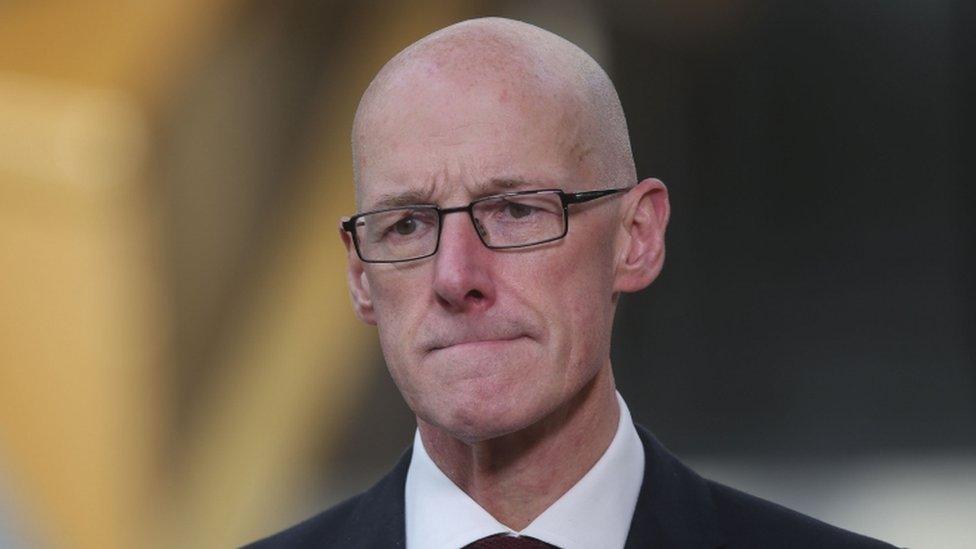
Mr Swinney is now expected to win a confidence vote in the Scottish Parliament after the Greens said they would back him
Scotland's education secretary has denied his school results U-turn was motivated by saving his job rather than the concerns of pupils.
John Swinney announced on Tuesday that tens of thousands of pupils would have their results upgraded.
It followed days of protests, with Mr Swinney also facing the prospect of losing a Holyrood vote of confidence.
Mr Swinney insisted that he made a decision to upgrade the results "as quickly as I possibly could".
But he said he had waited until yesterday to announce the changes - a week after the results were issued - because he had a duty to inform the Scottish Parliament first.
Mr Swinney also continued to insist that the moderation system put in place by the Scottish Qualifications Authority (SQA) had been "perfectly fair".
About 75,000 pupils had their results downgraded by the SQA from the grades that had originally been put forward for them by their teachers.
It sparked claims of a "postcode lottery" that unfairly hit pupils from more deprived backgrounds because the SQA took into account the previous performance of schools when allocating final results.
Mr Swinney and First Minister Nicola Sturgeon spent much of last week defending the process, claiming that basing results purely on teachers estimates would have damaged the credibility of the qualifications system.
Opposition parties had looked likely to win a vote of no confidence in Mr Swinney later this week.
But his U-turn means the Scottish Greens will now back him - which would give him enough votes to win.
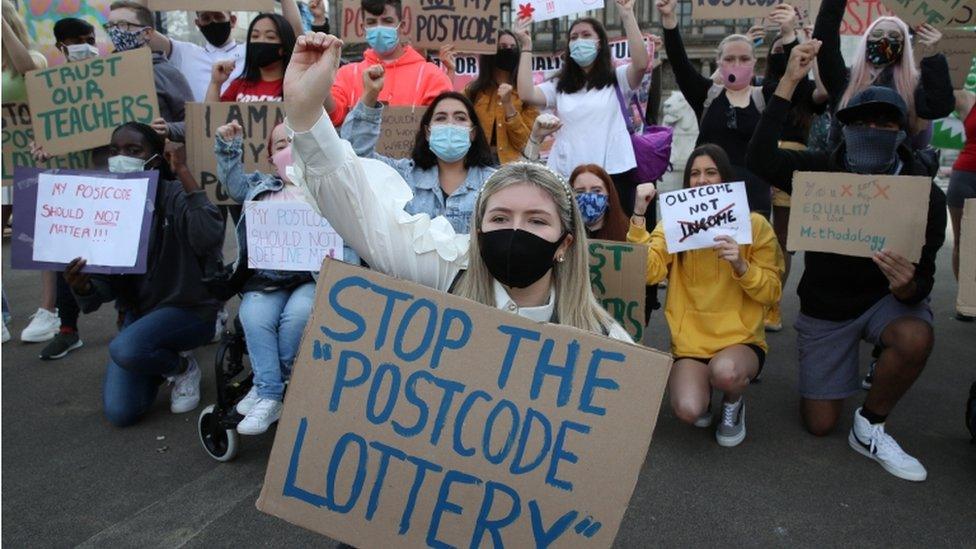
Some pupils had staged protests over the downgraded results
Speaking to the BBC's Good Morning Scotland programme, Mr Swinney was asked whether it was the threat of losing the confidence vote - rather than the days of protests by pupils - that had made him change his mind.
He replied: "No", and insisted he had recognised last week that there was a "problem" with the results and that something would need to be done.
He said he had waited until yesterday because it was the day the Scottish Parliament returned from recess.
He added: "The people who are now calling for my resignation would have complained if I had not announced what I announced yesterday to parliament.
"I said last Thursday what I was going to do to parliament and make a statement, so it was obvious we were going to do something about the exams".
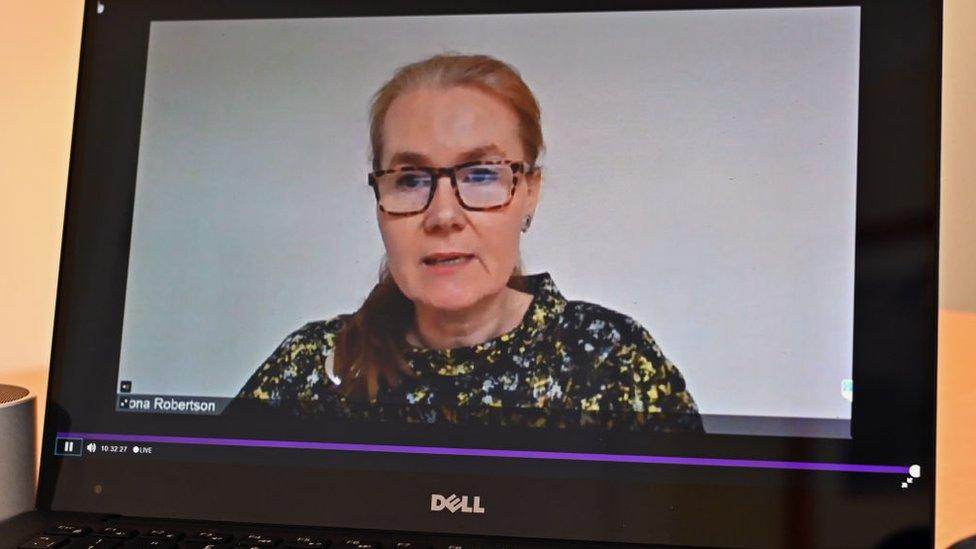
SQA chief Fiona Robertson told MSPs that teacher estimates of grades were "not always accurate"
Mr Swinney continued to insist that the SQA's moderation process had been a "perfectly fair model" which had "emphasised heavily the importance of maintaining standards from previous years to this year".
But he said he had changed his mind after listening to the "heartfelt pleas" and "anguish" from young people who had been affected.
He added: "The reflection that I came to, having listened to young people, was that we had to look at 2020 differently.
"We had to recognise that young people have had a significant disruption to their lives in 2020 because of Covid-19, and we should not emphasise the need to maintain standards - which was the direction I had given to the SQA back in March."
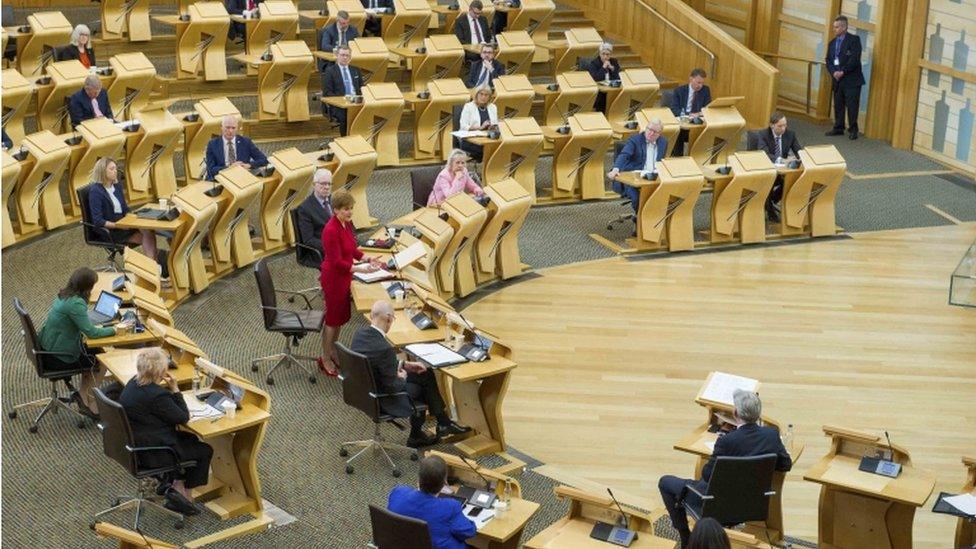
Mr Swinney said he had a duty to inform parliament first about the changes he was making to the results
First Minister Nicola Sturgeon said last week that accepting teacher estimates without moderation would lead to an exceptionally high pass rate compared to previous years, which she said would not be "credible".
And Mr Swinney previously said he believed teachers were often "optimistic and aspirational" about their pupils' abilities, while an exam system "does something different".
The changes announced on Tuesday mean that this year's Higher pass rate will now sit at 89.2%, up 14.4 percentage points on 2019, while the Advanced Higher pass rate is at 93.1%, up 13.7 points from the previous year.
SQA chief Fiona Robertson told Holyrood's education committee on Wednesday that she was "keenly aware of the strength of feeling" about the results - but said it felt "essential" to "maintain standards" between different schools and years.
She said the SQA treated teacher estimates with "utmost respect", but there was a "clear and unequivocal case for some moderation" because they were "not always accurate".
Ms Robertson said there was evidence that the accuracy of teacher estimates of final results were "below 50%" in previous years.
She said she accepted that the moderation "felt very personal" to some students, but insisted that schools were "not seen as postcodes at all" by the system.
The SQA says schools will receive the new, confirmed results "as soon as possible and no later than the end of next week", with fresh certificates also being sent out to affected candidates.
The government has also pledged to ensure there are sufficient places in universities and colleges, so that "no one is crowded out of a place they would otherwise have been awarded".
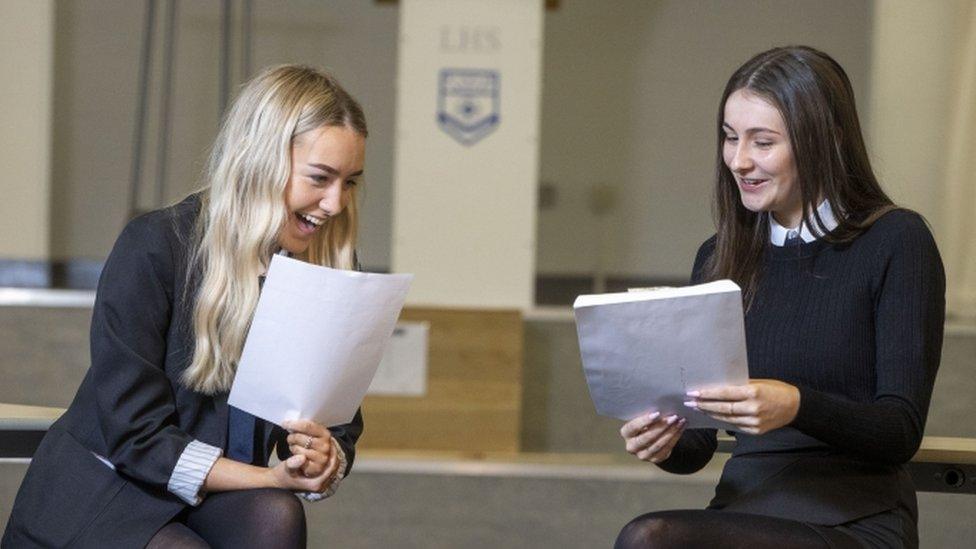
A-level results in England, Wales and Northern Ireland are due out on Thursday
Scottish Labour still intends to hold a vote of confidence on Mr Swinney this week, accusing him of leaving pupils "twisting in the wind for a week", and urging him to "take full responsibility for it happening in the first place and resign".
They will be backed by the Conservatives and Liberal Democrats - but the Scottish Greens said Mr Swinney's announcement met their demands, and they would now support him in the vote.
It means Mr Swinney will have enough votes in parliament to win.
A-level and GCSE students in England have been promised that their final results will be no lower than their mock exams.
It means pupils getting A-level results this week can accept that estimated grade, change it for a mark gained in a mock exam or choose to take a written exam in the autumn.